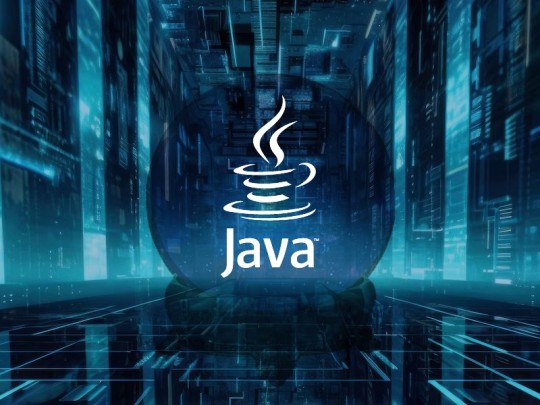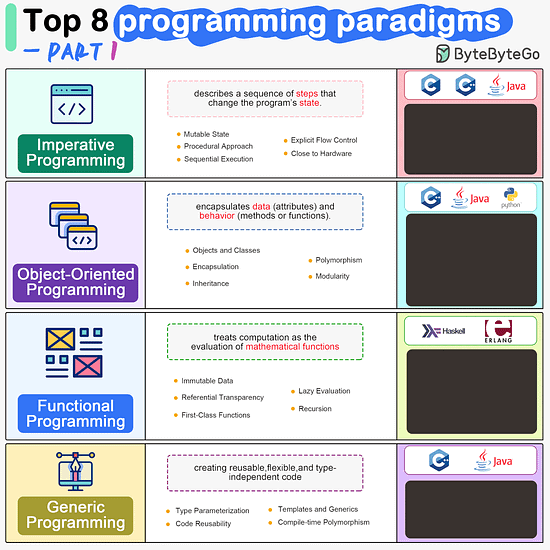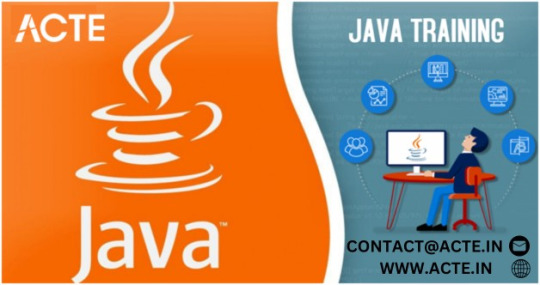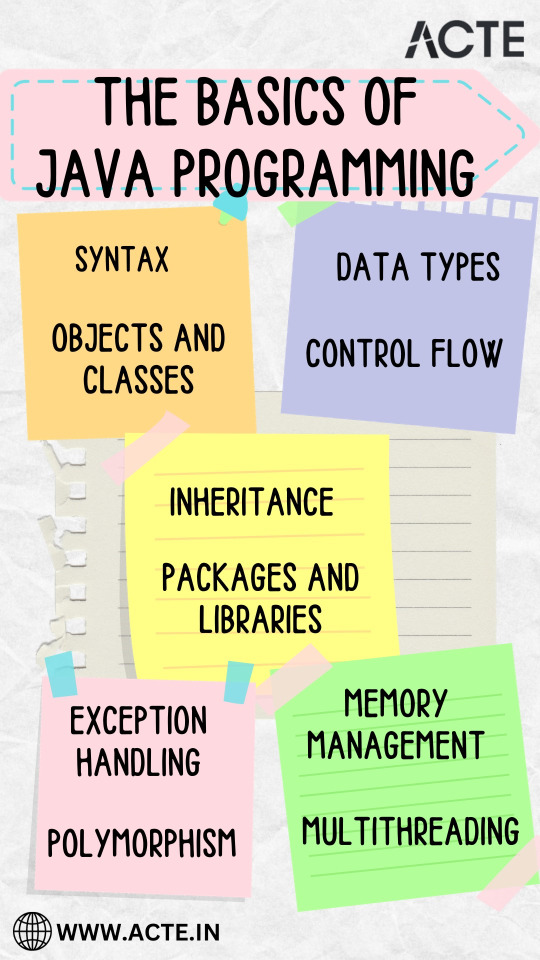#oops concepts in java
Explore tagged Tumblr posts
Text
Understanding Object-Oriented Programming and OOPs Concepts in Java
Object-oriented programming (OOP) is a paradigm that has revolutionized software development by organizing code around the concept of objects. Java, a widely used programming language, embraces the principles of OOP to provide a robust and flexible platform for developing scalable and maintainable applications. In this article, we will delve into the fundamental concepts of Object-Oriented Programming and explore how they are implemented in Java.

Object-Oriented Programming:
At its core, Object-Oriented Programming is centered on the idea of encapsulating data and behavior into objects. An object is a self-contained unit that represents a real-world entity, combining data and the operations that can be performed on that data. This approach enhances code modularity, and reusability, and makes it easier to understand and maintain.
Four Pillars of Object-Oriented Programming:
Encapsulation: Encapsulation involves bundling data (attributes) and methods (functions) that operate on the data within a single unit, i.e., an object. This encapsulation shields the internal implementation details from the outside world, promoting information hiding and reducing complexity.
Abstraction: Abstraction is the process of simplifying complex systems by modeling classes based on essential properties. In Java, abstraction is achieved through abstract classes and interfaces. Abstract classes define common characteristics for a group of related classes, while interfaces declare a set of methods that must be implemented by the classes that implement the interface.
Inheritance: Inheritance is a mechanism that allows a new class (subclass or derived class) to inherit properties and behaviors of an existing class (superclass or base class). This promotes code reuse and establishes a hierarchy, facilitating the creation of specialized classes while maintaining a common base.
Polymorphism: Polymorphism allows objects of different types to be treated as objects of a common type. This is achieved through method overloading and method overriding. Method overloading involves defining multiple methods with the same name but different parameters within a class, while method overriding allows a subclass to provide a specific implementation of a method that is already defined in its superclass.
Java Implementation of OOP Concepts:
Classes and Objects: In Java, a class is a blueprint for creating objects. It defines the attributes and methods that the objects of the class will have. Objects are instances of classes, and each object has its own set of attributes and methods. Classes in Java encapsulate data and behavior, fostering the principles of encapsulation and abstraction.
Abstraction in Java: Abstraction in Java is achieved through abstract classes and interfaces. Abstract classes can have abstract methods (methods without a body) that must be implemented by their subclasses. Interfaces declare a set of methods that must be implemented by any class that implements the interface, promoting a higher level of abstraction.
Inheritance in Java: Java supports single and multiple inheritances through classes and interfaces. Subclasses in Java can inherit attributes and methods from a superclass using the extends keyword for classes and the implements keyword for interfaces. Inheritance enhances code reuse and allows the creation of specialized classes while maintaining a common base.
Polymorphism in Java: Polymorphism in Java is manifested through method overloading and overriding. Method overloading allows a class to define multiple methods with the same name but different parameters. Method overriding occurs when a subclass provides a specific implementation for a method that is already defined in its superclass. This enables the use of a common interface for different types of objects.
Final Thoughts:
Object-oriented programming and its concepts form the foundation of modern software development. Java, with its robust support for OOP, empowers developers to create scalable, modular, and maintainable applications. Understanding the principles of encapsulation, abstraction, inheritance, and polymorphism is crucial for harnessing the full potential of OOPs concepts in Java. As you continue your journey in software development, a solid grasp of these concepts will be invaluable in designing efficient and effective solutions.
#javascript#javaprogramming#java online training#oops concepts in java#object oriented programming#education#technology#study blog#software#it#object oriented ontology#java course
3 notes
·
View notes
Text
Oops Concepts - Java Programming: Unveiling the Core Principles
Java programming stands as an enduring pillar in the coding landscape, owed largely to its robust foundation in Object-Oriented Programming (OOP). In this comprehensive guide, we will embark on a journey into the intricate world of OOP within the Java context, unraveling complex concepts and providing pragmatic examples to reinforce your understanding.
1 note
·
View note
Text
also i might need to learn some rust to prepare myself for the insane task on writing a linux-like os kernel in rust + x86 assembly that will be forced upon me during the next term. which means that i have to learn both cpp and rust kind of simultaneously? hate when this happens
#i have superficial familiarity with cpp (i know basic c + i wrote algos in cpp)#and i know enough about like oop from other languages (mainly java unfortunately)#but i have no idea how the specifics of cpp work.....#oh did i say i know basic c? sorry i mean i know c pretty well actuallt#i still have no idea what the fuck is a template. is it like a generic? no idea#i have a vague understanding of a concept of a namespace
1 note
·
View note
Text
OOPS NOTES
OOPS NOTES
View On WordPress
0 notes
Text
Today I had an OOP class. I really like the teaching method being employed by the lecturer. When I got back home I decided to write the lecture notes because the lecture was available online so I didn't have to split my attention in class between writing notes and trying to understand what was being taught. I also did a quiz on it after I finished writing my notes and I had a 10/10( ꈍᴗꈍ)
I have a programming assignment to do but imma watch the YouTube course for Java before I start on it. I want to have the key concepts down before I do it. Luckily I have the whole weekend to finish the assignment.



#studyinspo#study inspiration#study with me#studygram#back to school#study notes#college#student#university#study tips#study#study aesthetic#study blog#study motivation#studyblr#studyspo
25 notes
·
View notes
Text
The concept of object oriented programming explained
Object-oriented programming is a fundamental concept present in numerous programming languages such as C++, Java, JavaScript, and more. It becomes straightforward once you truly grasp it, and that's precisely what this post aims to help you achieve. So, stop your scrolling for a second and delve into this post for a thorough and clear explanation.

Understanding the Term "Object-Oriented"
To grasp OOP, let's begin by explaining the name itself: "Object-Oriented." This term signifies that OOP revolves around entities known as "objects."
What Exactly Is an Object?
An object in OOP is any entity that possesses both state and behavior. Consider a dog as an example: it has states such as color, name, and breed, while its behaviors encompass actions like wagging the tail, barking, and eating.
The reason we introduce the concept of objects in programming is to effectively represent real-world entities, a task that cannot be accomplished with conventional variables or arrays.
Classes: Abstract Forms of Objects
Now, what about classes? A class is essentially the abstract form of an object. If we take the example of a "dog," the object "Mydog" is a concrete instance, while the class "dog" represents dogs in a more general sense. Think of a class as a blueprint or template from which you can create individual objects.
Four Pillars of Object-Oriented Programming
Now that we've established the fundamentals of objects and classes. OOP is built upon four key principles:
Inheritance: Inheritance occurs when one object inherits all the properties and behaviors of a parent object. It promotes code reusability and facilitates runtime polymorphism.
Polymorphism: Polymorphism entails performing a single task in multiple ways. For instance, it can involve presenting information differently to customers or implementing different shapes like triangles or rectangles.
Abstraction: Abstraction is about concealing internal details while exposing functionality. Consider a phone call; we don't need to understand the intricate inner workings.
Encapsulation: Encapsulation involves bundling code and data into a single unit. Just like a capsule contains various medicines . In a fully encapsulated class (e.g., a Java bean), all data members are private, ensuring data integrity and controlled access.
I remember finding these images that explained these concepts using the 'Squid Game' series, and they are just perfect. So, I'm sharing them here and giving all credit to their owner :
Polymorphism , Inheritance , Encapsulation
#code#codeblr#css#html#python#studyblr#progblr#programming#comp sci#web design#web developers#web development#website design#webdev#website#tech#html css#learn to code#OOP#object oriented programming
43 notes
·
View notes
Text

ByteByteGo | Newsletter/Blog
From the newsletter:
Imperative Programming Imperative programming describes a sequence of steps that change the program’s state. Languages like C, C++, Java, Python (to an extent), and many others support imperative programming styles.
Declarative Programming Declarative programming emphasizes expressing logic and functionalities without describing the control flow explicitly. Functional programming is a popular form of declarative programming.
Object-Oriented Programming (OOP) Object-oriented programming (OOP) revolves around the concept of objects, which encapsulate data (attributes) and behavior (methods or functions). Common object-oriented programming languages include Java, C++, Python, Ruby, and C#.
Aspect-Oriented Programming (AOP) Aspect-oriented programming (AOP) aims to modularize concerns that cut across multiple parts of a software system. AspectJ is one of the most well-known AOP frameworks that extends Java with AOP capabilities.
Functional Programming Functional Programming (FP) treats computation as the evaluation of mathematical functions and emphasizes the use of immutable data and declarative expressions. Languages like Haskell, Lisp, Erlang, and some features in languages like JavaScript, Python, and Scala support functional programming paradigms.
Reactive Programming Reactive Programming deals with asynchronous data streams and the propagation of changes. Event-driven applications, and streaming data processing applications benefit from reactive programming.
Generic Programming Generic Programming aims at creating reusable, flexible, and type-independent code by allowing algorithms and data structures to be written without specifying the types they will operate on. Generic programming is extensively used in libraries and frameworks to create data structures like lists, stacks, queues, and algorithms like sorting, searching.
Concurrent Programming Concurrent Programming deals with the execution of multiple tasks or processes simultaneously, improving performance and resource utilization. Concurrent programming is utilized in various applications, including multi-threaded servers, parallel processing, concurrent web servers, and high-performance computing.
#bytebytego#resource#programming#concurrent#generic#reactive#funtional#aspect#oriented#aop#fp#object#oop#declarative#imperative
8 notes
·
View notes
Text
Mastering Java: Your Comprehensive Guide to Programming Excellence
Embarking on the journey of mastering Java is akin to entering a realm of endless possibilities. Java, a versatile and widely-utilized programming language, offers a broad spectrum of applications, from crafting web and mobile applications to powering robust enterprise systems. Whether you are a novice in the realm of coding or a seasoned programmer looking to broaden your skill set, the path to proficiency in Java is an exciting one.

In this comprehensive guide, we will be your guiding light through the intricacies of Java, starting from the foundational basics and progressing to the more advanced aspects of the language. Our objective is to equip you with the knowledge and skills that form a robust and unshakable foundation for your journey into the vibrant world of Java. Fasten your seatbelt as we embark on this exhilarating exploration, charting a course that will empower you to thrive in the ever-evolving landscape of software development.
Here's a 8-step guide to effectively learn Java
Step 1: Setting Up Your Development Environment
Your journey to becoming a proficient Java developer commences with setting up your development environment. The essential components are the Java Development Kit (JDK) and an Integrated Development Environment (IDE) like Eclipse or IntelliJ IDEA. These tools aren't just convenient; they're the gears that will drive your Java programming endeavors. They streamline the coding process, provide useful features, and offer an organized workspace, making your coding experience efficient and enjoyable.
Step 2: The Foundation - Learning the Basics
With your development environment ready, it's time to delve into the fundamental building blocks of Java. Begin by acquainting yourself with data types, variables, operators, and control structures. These are the nuts and bolts of the language, and a solid grasp of these concepts is essential. You'll find an abundance of online tutorials and beginner-friendly Java books to assist you at this stage.
Step 3: Navigating the World of Object-Oriented Programming (OOP)
The object-oriented programming (OOP) approach is well known in Java. To harness the true power of Java, immerse yourself in the world of OOP. Understand the concepts of classes, objects, inheritance, encapsulation, and polymorphism. This knowledge forms the bedrock of Java programming and enables you to design efficient, organized, and scalable code.
Step 4: Mastering Data Structures and Algorithms
Data structures (such as arrays, lists, and sets) and algorithms are the secret sauce behind solving real-world problems efficiently. As you progress, dive into the world of data structures and algorithms. These are the tools that will empower you to handle complex tasks and optimize your code. They're your go-to assets for creating efficient and responsive applications.
Step 5: The Art of Exception Handling
Java boasts a robust exception-handling mechanism. Understanding how to handle exceptions properly is not just an add-on skill; it's a vital aspect of writing reliable code. Exception handling ensures that your code gracefully manages unexpected situations, preventing crashes and delivering a seamless user experience.
Step 6: Exploring Input and Output Operations
In this step, you'll explore the realm of input and output (I/O) operations. Mastering I/O is crucial for reading and writing files, as well as interacting with users. You'll gain the ability to build applications that can efficiently process data and communicate effectively with users.
Step 7: Conquering Multi tasking
Java's support for multi tasking is a significant advantage. Understanding how to manage threads and synchronize their actions is vital for creating concurrent applications. Multithreading is the key to developing software that can handle multiple tasks simultaneously, making your applications responsive and scalable.
Step 8: Building Projects and Real-World Practice
Theory is only as valuable as its practical application. The final step involves applying what you've learned by building small projects. These projects serve as a proving ground for your skills and provide valuable additions to your portfolio. Whether it's a simple application or a more complex project, the act of building is where the real learning takes place.

As you step into this vibrant realm of Java, remember that continuous learning is the key to staying relevant and effective in the ever-evolving field of software development. Be open to exploring diverse applications, from web development to mobile apps and enterprise solutions, and never underestimate the power of hands-on practice. Building projects, no matter how small, will solidify your knowledge and boost your confidence.
In your quest to master Java, ACTE Technologies stands as a valuable ally. Their expert guidance and comprehensive training programs will sharpen your skills, boost your confidence, and pave the way for a rewarding career in software development. Whether you're embarking on your Java journey or looking to take your skills to the next level, ACTE Technologies offers the resources and support you need to thrive in the world of Java programming.
So, with Java as your trusty companion, and ACTE Technologies as your guide, the possibilities are boundless. Your journey is just beginning, and the world of software development awaits your innovation and expertise. Best of luck on your path to mastering Java!
9 notes
·
View notes
Text
Master Java Programming: Your Guide to Building Robust Applications
If you're searching for the best Java training institute in Hyderabad, look no further. Java remains one of the most versatile and widely-used programming languages, offering developers endless opportunities. Whether you're a beginner or an experienced coder, mastering Java can significantly enhance your career prospects.
Why Learn Java?
Java is a platform-independent language, meaning applications developed using Java can run on any device that supports the Java Virtual Machine (JVM). This makes it a preferred choice for developing enterprise-level applications, Android apps, web applications, and more. Moreover, with its object-oriented programming (OOP) principles, Java provides a robust framework for building secure and scalable applications.
Key Concepts in Java Programming
Object-Oriented Programming: Java’s OOP concepts like inheritance, polymorphism, and encapsulation ensure clean and modular code.
Multithreading: Efficiently manage concurrent processes to build high-performance applications.
Exception Handling: Write error-free programs with Java’s extensive error management tools.
Java APIs and Libraries: Access a wide range of APIs and libraries to speed up development.
Career Opportunities with Java
From software development to web application design, Java developers are in high demand across industries. Proficiency in Java can lead to roles such as Java Developer, Software Engineer, or Application Developer, offering competitive salaries and growth opportunities.
Conclusion
For those aspiring to excel in the tech industry, Java is an essential skill to master. Enroll in the best Java training institute in Hyderabad and kickstart your journey towards becoming a proficient developer. Consider Monopoly IT Solutions for comprehensive training, hands-on projects, and expert guidance to turn your programming aspirations into reality.
0 notes
Text
Is Java and Core Java Same?

Is Java and Core Java Same? This is a common question among beginners in programming. Java is one of the most popular programming languages for web development, enterprise applications, and mobile development. However, many learners often confuse Java with Core Java during their initial learning phase. Let's clear up these misconceptions and understand the key differences between them.
Java Nowadays
Java is a high-level, object-oriented programming language developed during the times of Sun Microsystems and now owned by Oracle. It is a platform-independent language that can run on whatever operating system you may choose. Java uses web applications, mobile applications (Android), video game applications, and large-scale enterprise systems.
What are some of the Core Java?
Core Java includes basic building blocks of Java components, and it refers to these basic principles using which we can create general-purpose applications. It mainly emphasizes:
OOP (Object-Oriented Programming) Concepts
Data Types and Variables
Exception handling
Multi-threading
Collection Frameworks
JDBC (Java Database Connectivity)
Main Drawbacks Between Java and Core Java
Java is a complete programming language and platform which lends all Core Java, Advanced Java, Java EE and Java ME. Applications from different domains are compiled here, including enterprise solutions, mobile apps, and web applications.
On the other hand, Core Java is the language's core concepts focused especially for standalone applications. It is very basic in what it offers such as object-oriented programming, exception handling, and even multithreading but does not touch advanced libraries and frameworks.
It can be said that Core Java provides the foundation upon which Java may be mastered, which includes frameworks, web development, and database management, to study further.
Final Ratings
Java and Core Java are not similar in one another, but Core Java is a small part of Java which basically deals with essential concepts which are useful in Java development. If you want to learn programming, you should begin your studies with Core Java and then advance into topics like Java EE making it more advanced, such as Android programming.
At TCCI-Tririd Computer Coaching Institute, we provide expert-led Java training, covering both Core Java and Advanced Java. Join us today to master Java programming with hands-on learning!
Location: Bopal & Iskon-Ambli Ahmedabad, Gujarat
Call now on +91 9825618292
Get information from: https://tccicomputercoaching.wordpress.com/
#Computer Training near S.P. Ring Road Ahmedabad#Computer Training near Satellite & Shela Ahmedabad#Java Training in Bopal Ahmedabad#SQL & Database Training near ISKCON Cross Road Ahmedabad#TCCI - Tririd Computer Coaching Institute
0 notes
Text
How Computer Assignment Help UK Assists Students with Java and C++ Projects
Java and C++ are fundamental programming languages that are widely used in software development, game development, and system applications. As popular as they are, students tend to struggle with assignments due to complex syntax, debugging, and the stress of submitting work on time. This is where computer assignment help UK comes into play. At Locus Assignment, we provide expert assistance to help students get their assignments done accurately and timely. Whether you need help with the assignment on Java in the UK or guidance on C++ coding, expert services provided by us ensure learning is easy and effective.
Why are Java and C++ Important to Students?
Java and C++ are essential for having a solid computer science background. This is why:
Java for enterprise software: Java is required for enterprise software, smartphone applications, and web development. Learning Java enhances job prospects in leading technology businesses.
C++ for High-Performance Computing: C++ has a vast number of applications in system programming, game development, and embedded systems. C++ programming enables students to create efficient and scalable programs.
Object-Oriented Programming (OOP) Concepts: The two programming languages both employ OOP concepts, which improve solving problems and are portable to programming languages like C# and Python.
Career opportunities: Organisations prefer Java and C++ professionals, leading to better job opportunities and professional growth in the field of IT.
Common Issues Faced by the Students in Java and C++ assignment
Students typically find C++ and Java assignments challenging because:
Advanced Syntactics and Concepts: Data structures, object-oriented programming, and memory allocation are challenging to learn.
Writing the code is one thing; debugging takes patience and technical ability.
Implementation of the Algorithm: Most assignments include intricate algorithmic designs that require professional direction.
Tight Deadlines: Having multiple assignments as well as academic work can be stressful.
Practical Knowledge Deficiency: Learners lack the ability to apply theoretical knowledge to real-life situations.
How Locus Assignment delivers the best computer assignment assistance in the UK
We at Locus Assignment ensure academic success through the following specialised services:
Professional Mentoring: Our professional coders provide one-on-one mentorship, with explicit explanations of concepts.
Personalised Solutions: We customise assignments to meet university specifications and personal learning needs.
All assignments are original and thoroughly screened for plagiarism.
On-Time Delivery: We provide timely submissions to help students meet deadlines.
Reasonable Prices: Our low-cost services ensure quality work at affordable prices.
Our C++ and Java assignment Help UK comprises:
We provide quality programming assignment help UK with specialist services in C++ and Java:
Java Project Assistance: Covering object-oriented programming, GUI applications, multithreading, and database connectivity
C++ Project Assistance: Assistance with STL, file operations, memory management, and advanced algorithms
Live coding sessions: Interactive learning experiences in which students learn directly with professionals
Code Optimisation and Debugging: We assist students in optimising their code for enhanced efficiency and performance.
Code explanation and documentation: Well-documented assignments to ensure easier understanding and future revisions.
Conclusion
Java and C++ assignments may be challenging, but with the right guidance, students are able to excel in these programming languages. At Locus Assignment, we offer professional computer assignment help UK, and with that, students are able to achieve high-quality, well-organised assignments on time. If you require a Java assignment in UK or C++ project work, we are available to guide you through it. If you require coding assignment help UK, we have the best specialists who are ready to guide you towards academic success. Get the top programming assignment help UK right away and enhance your coding skills with professional guidance!
#Computer Assignment Help UK#Computer Assignment Help#Java assignment in UK#coding assignment help UK#programming assignment help UK#computer assignment assistance in the UK
0 notes
Text
Introduction to Core Java: Everything You Need to Know
What is Core Java?
Core Java refers to the fundamental components of the Java programming language, providing the building blocks for developing robust applications. It encompasses essential features such as object-oriented programming, exception handling, multithreading, and data structures. These core concepts form the foundation for advanced Java technologies like Spring, Hibernate, and Microservices.

Why Learn Core Java?
Java remains one of the most in-demand programming languages, widely used in web development, mobile applications, cloud computing, and enterprise software. Mastering Core Java allows developers to create scalable, secure, and efficient applications, making it an essential skill in the tech industry.
Key Features of Core Java
1. Platform Independence
Java's Write Once, Run Anywhere (WORA) capability allows applications to run on any platform that supports Java without modification.
2. Object-Oriented Programming (OOP)
Core Java follows OOP principles, enabling developers to structure code efficiently using concepts like encapsulation, inheritance, polymorphism, and abstraction.
3. Memory Management with JVM
The Java Virtual Machine (JVM) manages memory allocation and garbage collection, ensuring efficient use of system resources.
4. Exception Handling
Java provides a structured way to handle runtime errors using try-catch blocks, preventing unexpected crashes.
5. Multithreading
Java enables concurrent execution of tasks, improving application performance and responsiveness.
6. Rich API & Libraries
Java offers a vast set of built-in libraries for data structures, networking, file handling, and database connectivity.
Core Java Concepts Every Developer Should Know
🔹 Java Syntax & Data Types
Understanding Java's syntax, primitive data types, and control statements is essential for writing efficient code.
🔹 Classes & Objects
Java is a class-based language. Learning how to create and manipulate objects is fundamental.
🔹 Inheritance & Polymorphism
These OOP principles help in code reusability and flexibility.
🔹 Collections Framework
Java provides powerful data structures like ArrayList, HashMap, and LinkedList for handling data efficiently.
🔹 File Handling
Reading and writing files using Java’s I/O Streams is crucial for developing real-world applications.
🔹 Java 8 Features
Features like Lambda Expressions, Streams API, and Functional Interfaces improve code efficiency and readability.
Applications of Core Java
📌 Desktop Applications – Java is used in GUI-based applications like Eclipse IDE and NetBeans. 📌 Web Development – Servlets and JSP enable Java to power dynamic web applications. 📌 Mobile Applications – Android apps are primarily developed using Java. 📌 Enterprise Solutions – Many large-scale systems, like banking applications, rely on Java for security and scalability.
How to Get Started with Core Java?
1️⃣ Install JDK (Java Development Kit) – Download and install the latest JDK from the official Oracle website. 2️⃣ Set Up an IDE – Use Eclipse, IntelliJ IDEA, or NetBeans for writing and testing Java code. 3️⃣ Practice Basic Programs – Start with simple programs like Hello World, loops, and functions. 4️⃣ Work on Small Projects – Build mini-projects like a calculator, to-do list, or file manager. 5️⃣ Explore Advanced Concepts – Learn about multithreading, JDBC, and design patterns to expand your skills.
Final Thoughts
Mastering Core Java opens doors to exciting career opportunities in software development. Whether you're a beginner or an experienced coder, a strong foundation in Java is invaluable for creating scalable and efficient applications. Start learning today, and take the first step toward becoming a Java expert! For More Detail: Core Java Training in KPHB Upcoming Batches: https://linktr.ee/NIT_Training
#CoreJava#JavaProgramming#LearnJava#JavaDeveloper#Coding#Programming#JavaBasics#SoftwareDevelopment#TechLearning#JavaCourse#CodeNewbie#JavaTraining#KPHB#ObjectOrientedProgramming#Java8Features#DeveloperCommunity#CodingLife#ITCareer#TechEducation#ProgrammingForBeginners
0 notes
Text
Java Training in Indore – Master Java with Infograins TCS
Why Choose Java Training in Indore?
Java remains one of the most sought-after programming languages in the IT industry. Whether you are a beginner or an experienced professional, mastering Java can unlock numerous career opportunities. If you are looking for Java Training in Indore, Infograins TCS provides the best learning experience with practical exposure.

What Makes Our Java Training Unique?
Comprehensive Curriculum – Covering core and advanced Java concepts, including OOPs, JDBC, Servlets, JSP, and Spring Framework.
Expert Trainers – Learn from experienced professionals who guide you through real-world applications.
Hands-on Projects – Practical training ensures you gain real-world experience.
Placement Assistance – Our program includes resume building, mock interviews, and job referrals.
Flexible Learning Modes – Choose from classroom or online training sessions based on your convenience.
Java Internship in Indore – Gain Industry Exposure
For students and fresh graduates looking to gain industry experience, our Java Internship in Indore offers hands-on exposure to real-world projects. This internship helps bridge the gap between theoretical knowledge and practical application, making you job-ready.
Key Highlights of Our Java Internship:
Work on live projects to understand Java’s practical applications.
Mentorship from experienced Java professionals.
Certificate upon successful completion to boost your resume.
Opportunity to work on frameworks like Spring, Hibernate, and Microservices.
Best Java Training in Indore – Your Gateway to a Successful Career
Infograins TCS is known for providing the best Java Training in Indore with a focus on skill development and practical learning. Whether you aim to become a Java Developer, Software Engineer, or Backend Developer, our training will help you achieve your career goals.
Why Infograins TCS?
Industry-recognized certification.
Interactive learning sessions with expert faculty.
Placement support with top IT companies.
Affordable course fees with flexible payment options.
Enroll Today!
Take your first step toward a rewarding career in Java programming. Join Infograins TCS for the best Java Training in Indore and get hands-on experience with industry-leading technologies. Enroll now and become a Java expert!
For more details, visit Infograins TCS Java Training.
0 notes
Text
10 Must-Learn Programming Concepts for Absolute Beginners

Learning to code can feel overwhelming, but mastering these 10 fundamental programming concepts will give you a strong foundation. Whether you're learning Python, JavaScript, or any other language, these principles apply everywhere!
1. Variables & Data Types
Variables store data, and understanding types (like integers, strings, booleans) is crucial. 📌 Example: name = "Alice" (Python)
2. Conditional Statements (If/Else)
Programs make decisions using if, else if, and else.
📌 Example:
if age >= 18:
print("Adult")
else:
print("Minor")
3. Loops (For & While)
Automate repetitive tasks with loops. 📌 Example: Printing numbers 1 to 5:
python
for i in range(1, 6):
print(i)
4. Functions Reusable blocks of code that perform specific tasks. 📌 Example:
python
def greet(name):
return f"Hello, {name}!"
5. Arrays/Lists
Collections of data that can be modified. 📌 Example: fruits = ["apple", "banana"]
6. Object-Oriented Programming (OOP) Organize code using classes and objects. (Key for languages like Java & Python)
7. Error Handling (Try/Except)
Prevent crashes by managing errors gracefully.
8. Algorithms & Basic Problem-Solving
Learn sorting, searching, and logic-building techniques.
9. Version Control (Git & GitHub)
Track code changes and collaborate with others.
10. Debugging Techniques Fixing errors using print statements, debuggers, and logging.
Want to Learn These Concepts in Depth? If you're serious about coding, check out my beginner-friendly programming courses that break down these concepts step by step!
0 notes
Text
MCA Subjects List: Key Topics to Learn in Your Master of Computer Applications Journey
The Master of Computer Applications (MCA) is a postgraduate degree designed for those aspiring to build a career in the IT sector. This program equips students with advanced knowledge in software development, system management, and emerging technologies, making them industry-ready professionals. Understanding MCA degree subjects can help you prepare for the academic journey ahead.

What Does the MCA Course Cover? The MCA program syllabus is thoughtfully spread across semesters, focusing on computer science principles, programming, and IT management skills. It is structured to gradually take students from basics to advanced technical knowledge.
MCA Subjects for the 1st Year
Semester I: Building Core Skills
Object-Oriented Programming (OOPs) with C++ – Learn core programming concepts like classes, objects, inheritance, and polymorphism.
Operating Systems – Understand system software, process scheduling, and memory management techniques.
Computer Organization & Architecture – Explore how computers work internally, including digital logic and processor design.
Discrete Mathematics – Covers essential mathematical structures like graphs, logic, and sets used in computing.
Financial Accounting – Introduces financial concepts useful for IT professionals working in business environments.
Semester II: Gaining Depth in Programming & Networks
Python Programming – Learn to code in Python for building applications and automating tasks.
Data Structures – Focus on different algorithms to manage and organise data efficiently.
Software Engineering – Study methodologies for designing, developing, and managing large software projects.
Data Communication & Networking – Learn how data travels across networks, with a focus on protocols and security.
Theory of Computation – Explore the fundamentals of computational models and complexity theory.
MCA Subjects for the 2nd Year
Semester III: Diving into Advanced Technologies
Database Management Systems (DBMS) – Study relational databases, SQL, and data management strategies.
Web Technologies – Gain hands-on skills in HTML, CSS, JavaScript, and back-end integration.
Information Security – Learn the principles of cybersecurity, encryption techniques, and risk assessment.
Artificial Intelligence (AI) – Explore AI concepts, machine learning, and neural networks.
Soft Computing – Study fuzzy logic, genetic algorithms, and other problem-solving techniques.
Semester IV: Practical Applications & Final Assessment
Capstone Project – A major project where students apply everything they've learned to solve real-world problems.
Comprehensive Viva – Oral examination covering all subjects studied throughout the course.
This is the structure of the two-year MCA syllabus at Uttaranchal University for online learners.
Is MCA a Tough Course? Duration and Structure The MCA course can be challenging, especially for those without prior knowledge of programming or higher mathematics. However, with steady effort and practice, it’s very achievable. Earlier, MCA was a three-year program. Now, under the New Education Policy (NEP), students with a BCA or BSc in Computer Science can opt for a two-year MCA program.
Career Opportunities After MCA
Hardware Engineer – Designs and maintains computer hardware systems, working closely with software teams to ensure smooth performance.
Software Developer – Builds software applications using programming languages like Java, Python, and C++.
Database Engineer – Develops and maintains databases for large organisations, ensuring data security and accessibility.
Data Scientist – Works with data analytics, machine learning, and visualisation tools to support business decisions.
Web Designer/Developer – Specialises in creating interactive, responsive websites and web applications.
IT Architect – Plans and designs IT systems and infrastructure for smooth business operations.
Cloud Architect – Focuses on designing secure, scalable cloud-based systems using platforms like AWS, Google Cloud, and Azure.
Conclusion The MCA course from Uttaranchal University offers a complete learning experience for those looking to excel in the IT field. With topics ranging from coding and database management to AI and cybersecurity, this degree sets the stage for exciting career opportunities. With commitment and practical learning, you can unlock numerous career paths in the fast-growing tech industry.
0 notes
Text
Mastering the Basics of Java: Your Gateway to Software Development
In the ever-evolving landscape of programming, Java stands as a versatile and widely-adopted language that has consistently been the preferred choice of developers worldwide. Whether you are a newcomer taking your first steps into the world of programming or an experienced developer seeking to broaden your skillset, acquiring a profound understanding of Java's fundamentals is an essential stride forward. In this comprehensive and meticulously crafted guide, we embark on a journey to delve deep into the core concepts of Java programming. This knowledge will not only serve as a strong foundation but also empower you to navigate the dynamic and ever-evolving domain of software development with confidence.

Java's popularity has endured for decades, and it shows no signs of slowing down. Its ability to adapt to the ever-shifting demands of the software industry, coupled with its cross-platform compatibility, has made it a mainstay for both beginners and seasoned professionals. Whether you aspire to develop web applications, mobile apps, or enterprise-grade software solutions, Java offers a versatile platform to turn your coding dreams into reality.
1. Syntax: The Building Blocks of Java
Java's syntax is often praised for its readability and similarity to other programming languages like C++ and C#. This makes it relatively easy to learn, especially if you have experience with these languages. The key feature of Java's syntax is the use of curly braces {} to define blocks of code. These braces play a fundamental role in structuring Java programs, making it essential to grasp their usage.
2. Objects and Classes: Embracing Object-Oriented Programming (OOP)
Java is an object-oriented programming (OOP) language, which means it revolves around the concepts of objects and classes. In Java, everything is treated as an object, and classes serve as blueprints for creating these objects. A class defines both the properties (fields) and behaviors (methods) of an object. Understanding the principles of OOP is vital for building well-structured and modular Java applications.
3. Data Types: The Foundation of Variables and Data Manipulation
Java supports a variety of data types, categorized into primitive data types (e.g., int, double, char) and reference data types (e.g., objects, arrays). Primitive data types represent basic values, while reference data types refer to objects created from classes. Grasping these data types is essential for declaring variables and manipulating data in your Java programs.
4. Control Flow: Directing the Flow of Your Program
Java provides an array of control flow statements that dictate the execution flow of your program. These include conditional statements (such as if-else and switch), looping statements (including for, while, and do-while), and branching statements (like break, continue, and return). Mastery of these control flow structures is crucial for creating efficient and logic-driven Java applications.
5. Inheritance: Building on Existing Foundations
Inheritance is a core concept in Java that enables you to create new classes based on existing ones. By inheriting the properties and behaviors of a parent class, you can promote code reusability and establish a more organized code structure. Inheritance is a powerful tool for designing extensible and scalable Java applications.
6. Polymorphism: Achieving Flexibility and Extensibility
Polymorphism is another hallmark of Java's object-oriented approach. It enables objects of various classes to be handled as though they were members of a single superclass. This flexibility in code design allows you to create more versatile and extensible applications. Understanding polymorphism is essential for leveraging the full potential of Java's object-oriented capabilities.
7. Exception Handling: Managing Errors Gracefully
Java boasts a robust exception-handling mechanism to deal with runtime errors. By using try-catch blocks, you can gracefully handle exceptions, ensuring that your program doesn't crash unexpectedly. Effective exception handling is a key aspect of writing robust and reliable Java code.
8. Packages and Libraries: Harnessing the Power of Java's Ecosystem
Java offers a vast standard library known as the Java Standard Library or Java API. Additionally, it allows you to organize your code into packages for better organization and modularity. Leveraging these packages and libraries is essential for streamlining your development process and tapping into a wealth of pre-built functionality.
9. Memory Management: The Art of Garbage Collection
Java employs a unique feature called garbage collection to automatically manage memory. This process helps prevent memory leaks and ensures efficient memory usage in your Java applications. Understanding how garbage collection works is crucial for maintaining the performance and stability of your programs.
10. Multithreading: Building Responsive and Scalable Applications
Java's support for multithreading allows you to execute multiple threads concurrently. Threads are smaller units of a process that can run independently, making it possible to build responsive and scalable applications. Mastering multithreading is essential for developing high-performance Java software, particularly in today's world of parallel computing.

Learning Java opens doors to a wide range of career opportunities in software development and information technology. Whether you're interested in building web applications, mobile apps, or enterprise solutions, Java's versatility makes it a valuable skill.
If you're looking to embark on your Java programming journey or enhance your existing skills, consider exploring courses and training programs offered by reputable institutions like ACTE Technologies. They provide comprehensive learning experiences and expert guidance to help you master Java and advance your career in this exciting field.
In conclusion, Java's robust features and wide-ranging applications make it a compelling choice for developers worldwide. By mastering its fundamental concepts and continuously expanding your knowledge, you'll be well-prepared to tackle complex projects and contribute to the ever-evolving world of software development. Good luck with your Java programming efforts!
8 notes
·
View notes